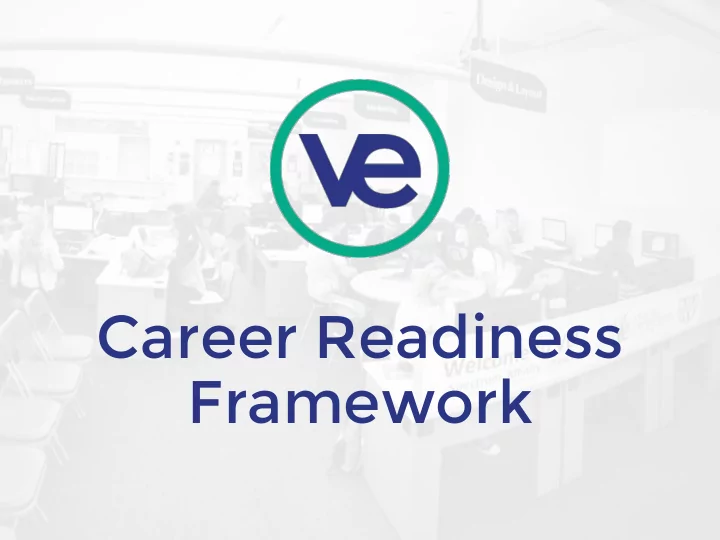

Career Readiness Framework
VEI Career Readiness Framework The proposed CRF incorporates the key competency dimensions that students Global Perspective develop through seven differentiated VE participants interface with students from around the world virtually throughout the program and in-person at the Trade features of the VE experience. Show, developing cross-cultural awareness. Day-to-Day Business Dynamics Assuming the Role Students work individually, in Students interview for departments, departments, and as a firm to such as Finance and Marketing, and Leadership develop a strategy and plan and roll roles, such as CEO, VP, and Associate. Knowledge and capabilities required to up their sleeves to implement it. Throughout the year, they execute establish direction, motivate self and Each firm develops a distinct culture against role-specific goals and are others, assume accountability, and and faces unique challenges. evaluated against these expectations. respond effectively to change. Competency Dimensions Professional Non-technical, transferable knowledge, Virtual Economy skills, and abilities required to succeed in Industry Partnerships a professional environment VE students buy and sell VE industry partners products and services, provide skills-based Functional prepare their taxes, select mentoring, serve as judges insurance and retirement for business plan Core business skills needed to perform options, and experience within a specific industry or business competitions, and offer financial market dynamics. function internships to students. Core Technology Skills Core technical skills needed to perform within a specific industry or business function Teacher as Consultant Competitions & Events VE is student-directed. There are no The National Business Plan traditional lessons, and the teacher Competition and International Trade acts as an active observer and Show provide opportunities for consultant. students to present their work and VE Enablers network with other VE firms.
VEI Career Readiness Framework The competency model identifies four dimensions of knowledge, skills, and abilities that VE students develop throughout the program; each is comprised of several core competencies associated with that dimension. Competency Dimensions Description Competencies Demonstrates intrapreneurship Knowledge and capabilities required to establish Coaches others and manages conflict direction, motivate self and others, assume Motivates others to act Leadership Adapts in an ambiguous environment accountability, and respond effectively to change Demonstrates well-rounded perspective and unique style Communicates effectively Collaborates with others Demonstrates effective project management Non-technical, transferable knowledge, skills, and Demonstrates self-development and learning orientation Professional abilities required to succeed in a professional Develops relationships and networks effectively environment Demonstrates professionalism Solves problems creatively Embraces diversity Understands general business dynamics Core business skills needed to perform within a Understands and applies financial concepts Functional specific industry or business function Conducts research and analysis Demonstrates strong quantitative ability Demonstrates industry/function-specific skills MS Excel Core technical skills needed to perform within a MS Word specific industry or business function Core Technology Skills MS Outlook Department / function-specific technology (e.g., InDesign, QuickBooks, etc.)
Recommend
More recommend